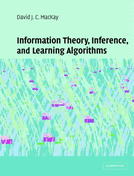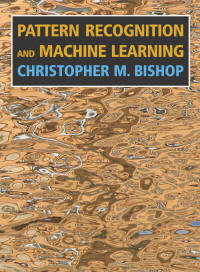ผลต่างระหว่างรุ่นของ "MINDLAB READING"
Jung (คุย | มีส่วนร่วม) |
Jung (คุย | มีส่วนร่วม) |
||
| แถว 66: | แถว 66: | ||
:* You should know what is an '''ergodic Markov chain''' | :* You should know what is an '''ergodic Markov chain''' | ||
:* You should know what is a '''detailed-balance property''' of a Markov chain | :* You should know what is a '''detailed-balance property''' of a Markov chain | ||
| + | |||
| + | ==June 1, 2007: Continue from previous meetings== | ||
| + | I'm sure that I cannot cover the topics of Markov chains, Monte Carlo and MCMC in just 2 meetings (starting from zero knowledge). Hence, this meeting intends to finish the program. | ||
| + | |||
| + | ==June 8, 2007: Invited Speaker, Parinya Chalermsook from University of Chicago== | ||
| + | He will talk about ordinary least square (OLS), principal component analysis (PCA) and regularization. | ||
| + | See his notes about the topics [[Machine Learning at U of C|here]]. | ||
==Useful Materials== | ==Useful Materials== | ||
รุ่นแก้ไขเมื่อ 15:19, 13 พฤษภาคม 2550
This page is created to be the (temporary?) main information page of the MIND lab reading group. Contents in our reading group can be any old or new (but interesting or important to many members) research works.
เนื้อหา
- 1 Plan
- 2 Date and Time
- 3 May 11, 2007: Mixture Models and EM algorithm
- 4 May 18, 2007: Finite Markov Chains
- 5 May 25, 2007: Monte Carlo Methods
- 6 June 1, 2007: Continue from previous meetings
- 7 June 8, 2007: Invited Speaker, Parinya Chalermsook from University of Chicago
- 8 Useful Materials
- 9 Interesting papers (please VOTE)
Plan
First NOTE that, although there will be a leader in a reading group, a reading group is NOT a talk. A leader might be the one who is most familiar with the selected topic, but he/she does not necessarily know everything. In order to keep a reading group survive, everyone should try quite hard to understand the selected material so that the discussions in a reading group will be fruitful.
For the first 2-3 week, Jung will take the lead. He will cover three topics which are frequently mentioned in literatures and he is most familiar with.
After that, if it successes, we hope that we can continue the process and change the leader week by week. The leader should have time at least 2 weeks to read the topic.
Date and Time
At this moment, I plan to arrange the reading group in every friday afternoon (1pm - 2pm), but let us talk for more convenient dates and times.
May 11, 2007: Mixture Models and EM algorithm
This topic is a nice introduction for Bayesian paradigm in machine learning. After this meeting, we should be able to answer the following questions:
- What is the Bayesian machine learning paradigm?
- The Bayes equation
- Why being Bayesian is a good idea? What are advantages of the Bayesian paradigm over the classical paradigm?
- It is intuitive, easy to understand (but might not easy to do)
- It can solve the model selection problem
- How can we train the learner in Bayesian paradigm?
- This talk illustrates one Bayesian toolkit: the EM algorithm.
- What is Ockham's razor? Does it make sense?
- To Bayesian philosophy, we show a reasonable solution of related problem: what is the best parameter space given a data?.
Main paper
- Chris Bishop's PRML book chapter 9. ( I have one copy left; anyone who do not have this book please feel free to borrow me)
Supplementary
- David Mackay's book chapters 2 (prerequisite), 20 and 22 get it here
- Zoubin Ghahramani's slide lecture1 lecture2 lecture3 (DO NOT read PCA and FA)
- Chris Bishop's slide click (DO NOT read variational inference)
Prerequisite
In order to understand how EM work, we have to understand a bit on Information entropy, the Jensen's inequality and Kullback-Leibler divergence. So please take a look at its properties before reading group: David Mackay's book chapter 2 is a very good introduction.
May 18, 2007: Finite Markov Chains

Last meeting illustrated one way to do Bayesian inference: the EM algorithm. However, it can give us only the maximum likelihood of the parameter which is not we exactly want in Bayesian inference. What we want in Bayesian inference is called marginalization (an inference based on averaging over all parameters). Normally, it is a real pain to calculate marginalization. Hence, our goal is to find a general Bayesian toolkit that can practically compute marginalization. Two most famous methods are (1) Monte Carlo sampling and (2) variational inference.
We want to cover Monte Carlo sampling but before that the notion of Markov chains is important.
Prerequisite
Mainly we require a fairly good knowledge on linear algebra E.g. pp. 347-358 of this book.
- You should know what is the eigen-decomposition of a matrix, or in other words a diagonalization.
Introduction to Markov Chain
- Stochastic processes without tear by Yuri Suhov Best introduction lecture notes on the topic
- A book chapter by C. M. Grinstead and J. L. Snell very good for a real newbie
- Eric Vigoda's lecture click.
May 25, 2007: Monte Carlo Methods
The topics we will cover are rejection sampling, uniform sampling, importance sampling, and the Markov chain Monte Carlo (MCMC) method, especially the Metropolis and the Gibbs algorithms. If there is enough time, Jung will briefly explain slice sampling, simulated annealing, MCMCMC and/or asymmetric Metropolis-Hasting methods.
Introduction to Monte Carlo
- David Mackay's book chapter 29
- Chris Bishop's book chapter 11
- Radford Neal's famous technical report click
- [1]
prerequisite
- Basically, all we need to know are topics from the last meeting
- You should know what is an ergodic Markov chain
- You should know what is a detailed-balance property of a Markov chain
June 1, 2007: Continue from previous meetings
I'm sure that I cannot cover the topics of Markov chains, Monte Carlo and MCMC in just 2 meetings (starting from zero knowledge). Hence, this meeting intends to finish the program.
June 8, 2007: Invited Speaker, Parinya Chalermsook from University of Chicago
He will talk about ordinary least square (OLS), principal component analysis (PCA) and regularization. See his notes about the topics here.
Useful Materials
- Tom Minka's in-depth notes on matrix algebra
- Some notes about Bayesian view on Ockham's razor
- A note by Ian Murray and Zoubin Ghahramani
- Also read David Mackay's chapter 28.
- Other ML courses
Interesting papers (please VOTE)
Classics Works
- These two papers are the origin of all boosting methods.
- A Theory of the Learnable by L. G. Valiant click
- Shannon's source coding and channel capacity theorems
- See Mackay's textbook.
- Inverse Problems: PCA, SVD and Regularization (Ockham's razor revisited) click.
Today's hot topics
- Graphical Models for Machine Learning (Bishop's book chapter 8).
- Kernel Methods and Gaussian Processes (Bishop's book chapter 6).
- Clustering (continue from first meeting)
- Various proposal to select K: X-means, G-means, PG-means, Full-Bayes
- Reduction of dimensionality: random projection method
- Some theory: Arora's paper
- Spectral Clustering (the currently hottest clustering algorithm)
